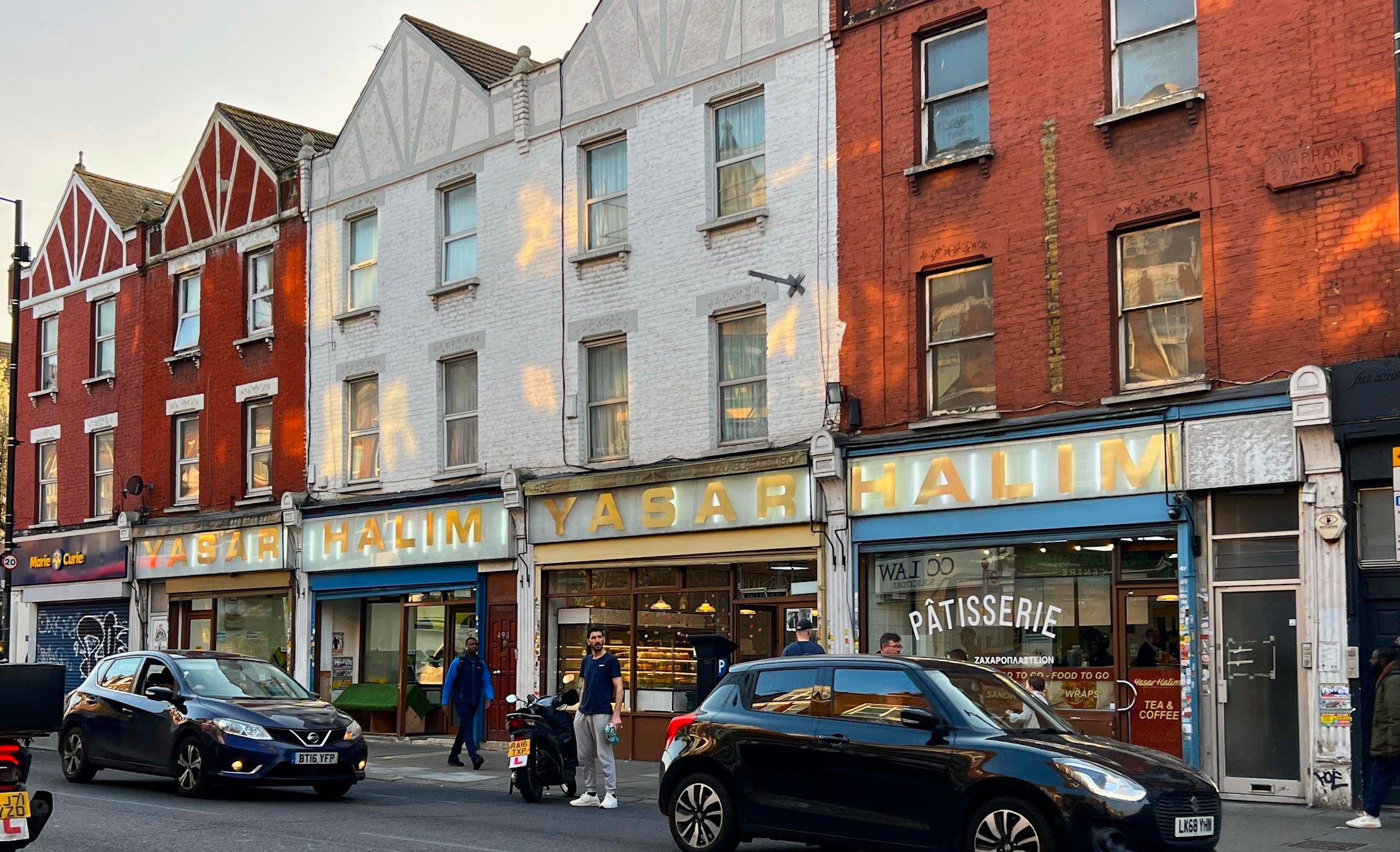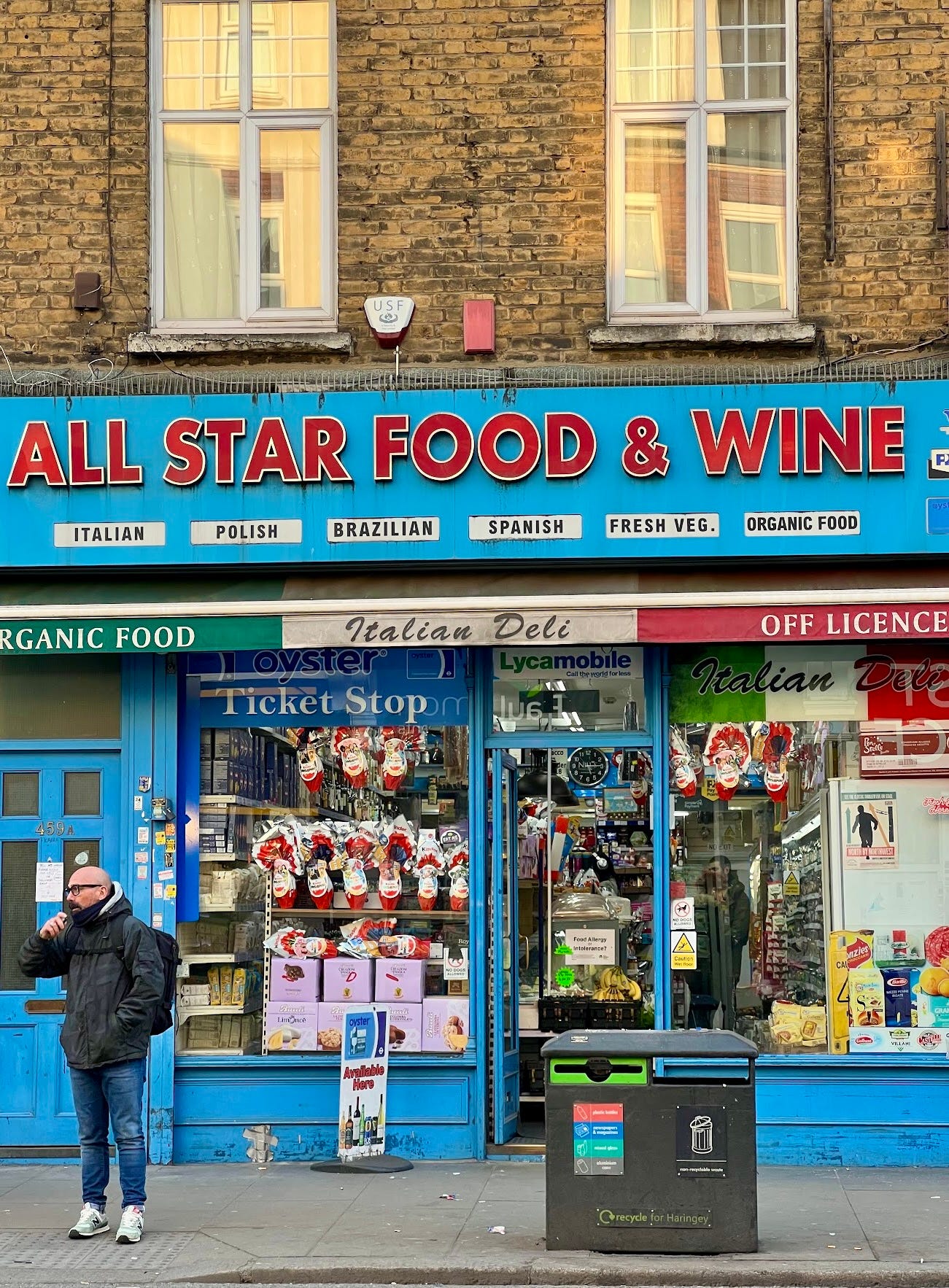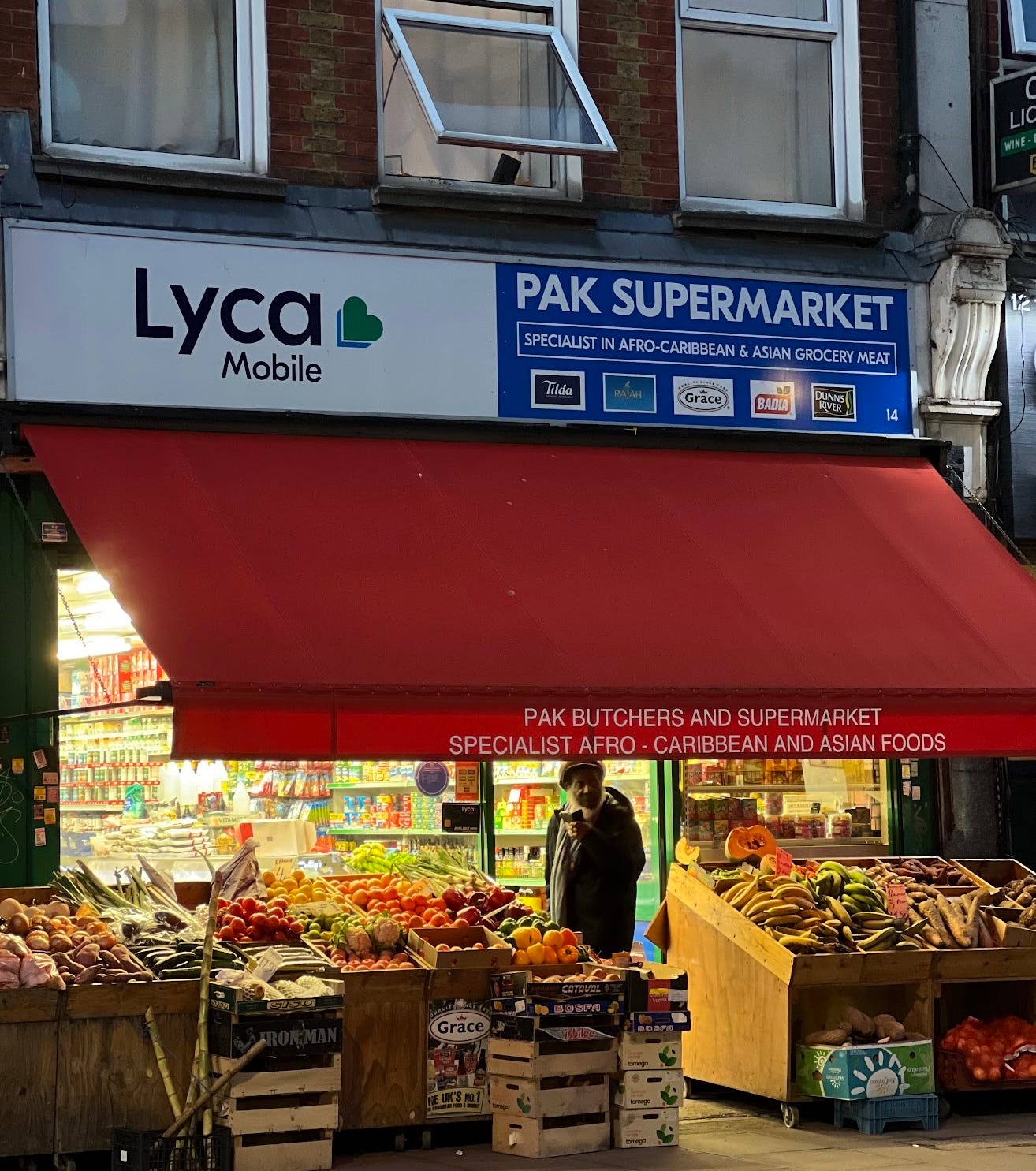Dear friends,
I turned thirty recently after a year of several life changes: the end of a three-year relationship, the start of my first lease, in a converted schoolhouse in Brooklyn, and a job at a company that ballooned from a team of fifteen to almost two hundred. The biggest thing I have been working on, through it all, is dialing the volume up on what I love and lifting it over the (real or imagined) voices of family, friends, coworkers, or the miscellaneous rich and powerful.
I spent my birthday walking down a single North London street visiting dozens of immigrant grocery stores: Romanian, Polish, Turkish, Italian, Pakistani, West African. I ended with a plate of spinach manti in a restaurant full of Uzbeks, watching Bollywood-style Central Asian music videos on a TV on the wall. It felt very me, and the world felt small and like a home.
One of my dreams is to tell the stories of people at cultural edges, whether new immigrants, like a Senegalese Sufi grocery store owner in Bed-Stuy or an exiled Afghan trumpet player in Boston, or older ones, like the proud Italian-American proprietors of the delis in Secaucus. Each story opens the door to a messy, complex, and gray humanity—and surprises and complicates our assumptions about people like them.
This is a reflection on my birthday and the ongoing process of tuning into myself. As always, I’d love to hear back.
Love,
Mishti
The afternoon I turned thirty, I stepped off at Palmers Green station with a purple fifty-pound note in my pocket, Queen Elizabeth folded between my index finger and thumb. I emerged into the sun on a suburban street where identical Edwardian buildings curled down the road like snails. I'd spent the previous night sketching a walking path using Google Maps breadcrumbs and old blog posts. For the next ten hours, I walked down Green Lanes, tracing a path through an array of immigrant grocery stores.
My first stop was a teal-bricked branch of Yasar Halim, a Turkish Cypriot grocery store started in the 70s by a reedy man who’d allegedly been delivered on a bread tray by a blind midwife in Nicosia. At noon on a Monday, the parking lot contained only a handful of cars.
The entrance displayed piles of produce in blue plastic crates: red-jeweled sour pomegranates, brown scaly snake fruits the size of a child's palm, yellow dates on branches, and flowered purple mangosteens. A tall woman in a long gray cardigan and black hijab inspected a snake fruit, then murmured something and placed it back. I hesitated for a moment, snapped a photo, and tucked a snake fruit into a plastic shopping bag.
She had already moved on, grazing her fingers carelessly over a handful of tiny orange peppers that she tossed into her basket without a glance. She nodded at the dark-bearded butcher and pointed at a box of chicken gizzards. Barely breaking stride, she floated past the Ramadan sale banner to the bread shelves, stacked with croissant-shaped çörek and flat bazlama as broad as the baker’s chest. Behind her shuffled a pale man in scuffed overalls, plucking bags of molehiya (dried jute leaves).
Across the store, two employees with identical side fades and black Nikes moved wordlessly in tandem, stocking thirty huge steel buckets of olives that sat under focus lights like museum artifacts. When they looked up, I buried myself in the nearest ingredient label: soutzoukos, a gray vacuum-sealed blob of almonds suspended in layers of boiled grape juice with bitter orange.
“The Greeks came here first, then the Turks,” explained my cashier, a young Turkish woman with heavy eyeliner, bleached blonde hair, and puffy lip filler. “We moved to Camden during the fighting in Cyprus in the 70s and worked our way north up the 29 bus line.”
“And pick up another snake fruit on your way out,” she chided. “There’s a deal on.” I slid one into my pocket and glided out the door, feeling giddy like a thief.
As I walked south, the stores turned Polish, Romanian, Bulgarian, Italian, Bangladeshi, West Indian, and Nigerian. I let myself be greedy, sucking an endless inhalation of newness until it felt like the right time to leave. In a Polish bakery, flour dust caught the light like snow. Romanian pickle barrels leaked brine onto concrete floors. The Nigerian shops hung stockfish from the ceiling like decorations. My camera accumulated dozens of pictures—candied white eggplant, amber carrot jam in squat jars, grape molasses dark as motor oil, sheep's cheese in stacked cylindrical tins.
Stepping into almost every store—often smaller than my NYC studio—came with a soft adrenaline bloom of entering a stranger’s living room. The glass doors would tinkle open and I’d lock eyes with the proprietors: a Romanian man with downy bald fuzz or a Greek lady with dramatic eyeliner and yellow crinkled mane.
In Jhumpa Lahiri’s latest story collection, a vacation home groundskeeper watches a foreign visitor gazing at the valley outside her cottage. She looks at all the things I look at every day, she says. But I wonder what else she sees in them.
I stayed gentle with my questions and photos, worried they’d read my curiosity as judgment or see me as an unwelcome outsider. Sometimes brief awkwardness faded into nothing: the Polish man who I asked about a tinned cheese stared vacantly at me until I waved my question away. But sometimes people I anticipated as harsh softened and opened, leaving me with a bubbly awe in between my ribs, rising between tears and laughter. My curiosity was meant with care, and those who felt that returned the blessing.
Hours of heightened attention both lifted and drained my energy. In the late afternoon, I found Clissold Park, where the city suddenly cracked open into expansive green. I pushed into the lawn, where teens practiced skateboard tricks, people read alone on green benches, and toddlers in yellow dresses chased one another on grass. The light shifted from golden to pink. Over my shoulder, to my shock, the sun was sinking like a giant red orb between two buildings. Everyone in the park pointed their cameras upward, and my muscles loosened with the relief of just being another person watching the sun.
The uniting golden thread of my life has been a love of the edges where cultures touch. My college admissions essay was about my love for commuting on NJ transit, where I met thick-accented Italian Americans, Palestinian food mart owners, and suited businesspeople. Decades later, the edges where cultures meet are still the places where I come alive.
Today, immigrants fill every nook and corner of the world: Russians in South India, Somalis in Minnesota, Punjabis in Tuscany. Coconut sellers in Hampi speak Hebrew, Senegalese Sufis worship together in Harlem, and a growing number of Hispanic Muslims live across the Americas. Ethnicity, religion, language, food, art, and politics overlap in strange and beautiful ways.
At the same time, we often easily recognize the rich diversity and complexity within our own social identity groups, but reduce others to flat stereotypes. Consider a Democrat who understands nuanced differences within liberal circles but views all Republicans as backward thinkers. A Catholic who recognizes the diversity of Christianity but assumes all atheists think alike. An American who appreciates various domestic regional cultures but believes all Chinese people act the same.
Our failure to understand other cultures blocks us from one of life's most meaningful experiences: feeling part of the whole. When we see people clearly, hate can soften to neutrality, neutrality to curiosity, curiosity to love. I want myself and others to see people more clearly and crack our assumptions open with room for surprise.
But learning to see others clearly means first learning to trust what I see in myself. Two years ago, during my last career gap, I published an essay about finding my next path. Reading it now, I see someone with the right instincts but the wrong map. I was stuffing my ideas into the language of Stripe Press, crafting pitches for venture capitalists using SF-speak about progress and democracy. After months of startup consulting and a few failed grant applications, I stopped and just took a job at a startup called Clay.
The choice set off a cascade of freedoms. My lease in NYC rooted me in a place for the first time since college. Being single gave me space to think bigger about my life choices. My job gave me the stability and flexibility to take creative risks and the benefit of highly subsidized therapy. And that, most impactfully of all, has given me the gift of self-perception.
My counselor is a young Indian-American woman with long curls, a warm voice, and eyes that catch what words don't say. She's the first person in my life who's watched me intensively for an hour at a time, perceiving subtle energy shifts in my body before I notice them. Weekly sessions train my attention on what I want at an atomic level and teach me how to prioritize it. I notice the pressure in my temples when I feel misunderstood, the flutter in my ribs when I feel seen. I notice the shift in her eyes when I tell her about wandering into a Senegalese grocery in Bed-Stuy and filming the owner. Authenticity cracks through the room, as palpable as a beam of light.
Indians will pay for astrologers, coaches, and pandits but rarely therapists, though the work offers different routes to the same goal: self-actualization. My therapist’s third-person perspective has helped me see and honor my unique gifts. It's not normal, she reminds me, to walk into a store and have the shopkeeper agree to share their life story on film, or to take an Uber ride and leave with the driver's number and an invitation to dinner. It's not normal for people across the political spectrum—from the far right to the far left—to open up to me and trust that I want to learn about them. It's not normal to write a five thousand word newsletter and receive five thousand words of commentary back.
The process helps break open the distinction between what I'm uniquely world-class at and love versus what I'm good at. It's easy to race up arbitrary ladders. In the past, I've collected CS and math coursework, finance jobs, and CFA exams, partly out of curiosity and partly as career insurance. I’ve chafed when well-meaning advisors have given me the choice between ambitious versus non-ambitious career paths. I am a fiercely, incredibly ambitious person. Declining a few routes for ambition let me channel it elsewhere, towards a ladder that matters more to me.
I could work to be in the top 1% of many job titles—a financial analyst, a software engineer, a VP of XYZ—but if the path to being one of 80 million comes at the cost of being one of one, I don’t want it. Understanding this has given me the charisma of caring less. I’m leaning harder into my strengths and growing the confidence to exist as my own category. (Ironically, the less attached I’ve become to traditional markers of progress, the more opportunities have come my way.)
My work belongs to a larger tradition of cultural storytelling. Why not make millions on a newsletter, start the world’s most popular docuseries, or write a Pulitzer-winning book? Why not think of Anthony Bourdain, Werner Herzog, or Lyse Doucet as peers rather than untouchable figures?
Magic happens when I give myself blank space to play. I had talked to my counselor about how birthday planning was exhausting. "I could find a summer cabin for my closest friends," I said, "or invite my local friends and family over for a ritual where I ask for feedback on my ideas." She looked at me for a few seconds and said nothing.
"Or maybe," I said, picking at the stickers on my water bottle, "I could just spend the day alone and take a long walk." She watched me carefully. Did I notice my shoulders had just relaxed?
The universe drenched my unplanned birthday week with serendipity. My best friend invited me to a secret show in London; I befriended the cast and performed the next night, meeting a slew of celebrities including Ben Stiller and Jerry Seinfeld. I ended my grocery store walk with a childhood friend I hadn’t spoken to in a decade and a cast member from that play. I left with a full pub table cheering me off, including friends of friends, a classmate from a logic class in NZ, and five people from my second cousin’s wedding.
I love following the same curiosity while traveling around my own neighborhood. Last month, I reserved an afternoon to wander and walked into an Arabian import store in Bed-Stuy. I left two hours later with a belly full of chai and a box of Algerian dates. Aladdin, the Egyptian cashier, quickly adopted me as a guest. He showed me pictures of his children and grandchildren and sat me at the cash register with an electric kettle heating us water for tea. For the next hour, I watched Mauritanian workers, on their seventh day in America, learn how to stock the store, and a South Sudanese man buy two giant suitcases. “Where are you traveling?” I asked. “I want to see this country,” he replied, with a giant grin. “I’m going to Baltimore.”
Not all of these encounters need to become something profound or world-changing. Sometimes I just go home with a box of dates and a full heart. But certain stories won't let me go, growing into the profiles I'm working on across writing, film, and photography, trusting that if I leap, the net will appear.
These stories are taking flight in different ways. I’m pitching some to magazines and keeping others as personal work. They’re about my hometown mayor, who memorizes thousands of birthdays and answers his cell phone at all hours, creating a pocket of functional governance five miles from Manhattan. Ayanna, a Black lesbian pastor, who serves the homeless in Oakland after 25 years in prison and a childhood dealing drugs on the streets. Qudrat, an exiled Afghan trumpeter, who pursues a music PhD in Boston after walking away from an evacuation flight to save his trumpet from the Taliban. Mohammed, a Senegalese Sufi, who runs a grocery store in Bed-Stuy and drives Uber on the side, watching soccer under the cash register on slow days and hoping to make a small American dream.
I'm grateful to people who've helped me think of editors and publishers for these pieces. I'm incredibly moved that some of you—including people I've never met—have pledged annual subscriptions to this Substack, even though I write rarely and have never turned payments on. It makes this small dream feel real.
Serendipity happens when I focus on doing things for the simple reason that I love them. I walked down Green Lanes on my thirtieth birthday for no other reason than that it was what my heart wanted. And that’s the only compass I need.















'candied white eggplant, amber carrot jam in squat jars, grape molasses dark as motor oil, sheep's cheese in stacked cylindrical tins', could you do a post with just photographs?
Your list of peers got me thinking... your writing style reminds me also of a travel memoir I read called "The Way of the Bull" by Leo Buscaglia. I recommend, it was great for me as I was learning to be vocal and intentional about learning different cultures for the first time. The way you describe life's interpersonal connections, really makes me want to strike up more conversations with the bodega man.